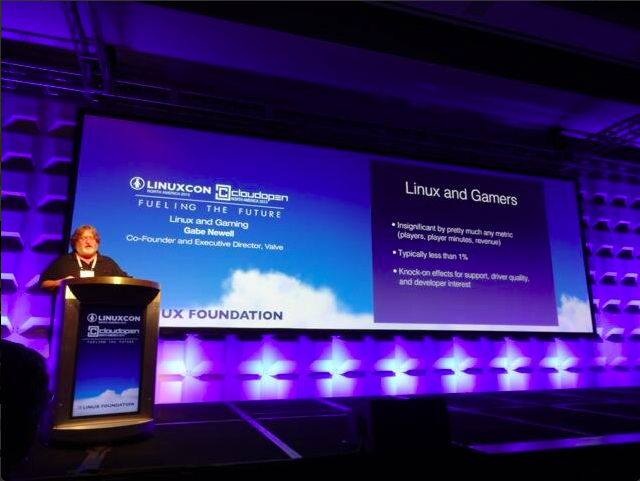
Gabe Newell, the co-founder and managing director of Valve, said today that Linux is the future of gaming despite its current minuscule share of the market.
That seems hard to believe, given that Newell acknowledged Linux gaming generally accounts for less than one percent of the market by any measure including players, player minutes, and revenue. But Valve is going to do its best to make sure Linux becomes the future of gaming by extending its Steam distribution platform to hardware designed for living rooms.
Newell made his comments while delivering a keynote at LinuxCon in New Orleans. "It feels a little bit funny coming here and telling you guys that Linux and open source are the future of gaming," Newell said. "It's sort of like going to Rome and teaching Catholicism to the pope."
Valve brought Steam to Linux in February, and the platform now has 198 games. Newell has previously promised to unveil a Linux-based "Steam box" to compete against living room gaming consoles sometime this year, and his company has updated the Steam software to work better on TVs. While he didn't specifically mention the Steam box today, Newell hinted at an announcement next week.
Developer and Publisher Gaijin Entertainment announced that their hit franchise and military MMOgame War Thunder will be a PlayStation 4 launch title. War Thunder is a state-of-the-art next generation MMO combat game that combines unparalleled online gameplay experiences that places PS4™ fans into action filled, highly explosive World War II aerial battles or mobilized over terrain using ground forces.

According to leaked internal documents from the German Federal Office for Information Security (BSI) that Die Zeit obtained, IT experts figured out that Windows 8, the touch-screen enabled, super-duper, but sales-challenged Microsoft operating system is outright dangerous for data security. It allows Microsoft to control the computer remotely through a built-in backdoor. Keys to that backdoor are likely accessible to the NSA – and in an unintended ironic twist, perhaps even to the Chinese.
The backdoor is called “Trusted Computing,” developed and promoted by the Trusted Computing Group, founded a decade ago by the all-American tech companies AMD, Cisco, Hewlett-Packard, IBM, Intel, Microsoft, and Wave Systems. Its core element is a chip, the Trusted Platform Module (TPM), and an operating system designed for it, such as Windows 8. Trusted Computing Group has developed the specifications of how the chip and operating systems work together.
Its purpose is Digital Rights Management and computer security. The system decides what software had been legally obtained and would be allowed to run on the computer, and what software, such as illegal copies or viruses and Trojans, should be disabled. The whole process would be governed by Windows, and through remote access, by Microsoft.
Now there is a new set of specifications out, creatively dubbed TPM 2.0. While TPM allowed users to opt in and out, TPM 2.0 is activated by default when the computer boots up. The user cannot turn it off. Microsoft decides what software can run on the computer, and the user cannot influence it in any way. Windows governs TPM 2.0. And what Microsoft does remotely is not visible to the user. In short, users of Windows 8 with TPM 2.0 surrender control over their machines the moment they turn it on for the first time.
Beta starts beginning of october.